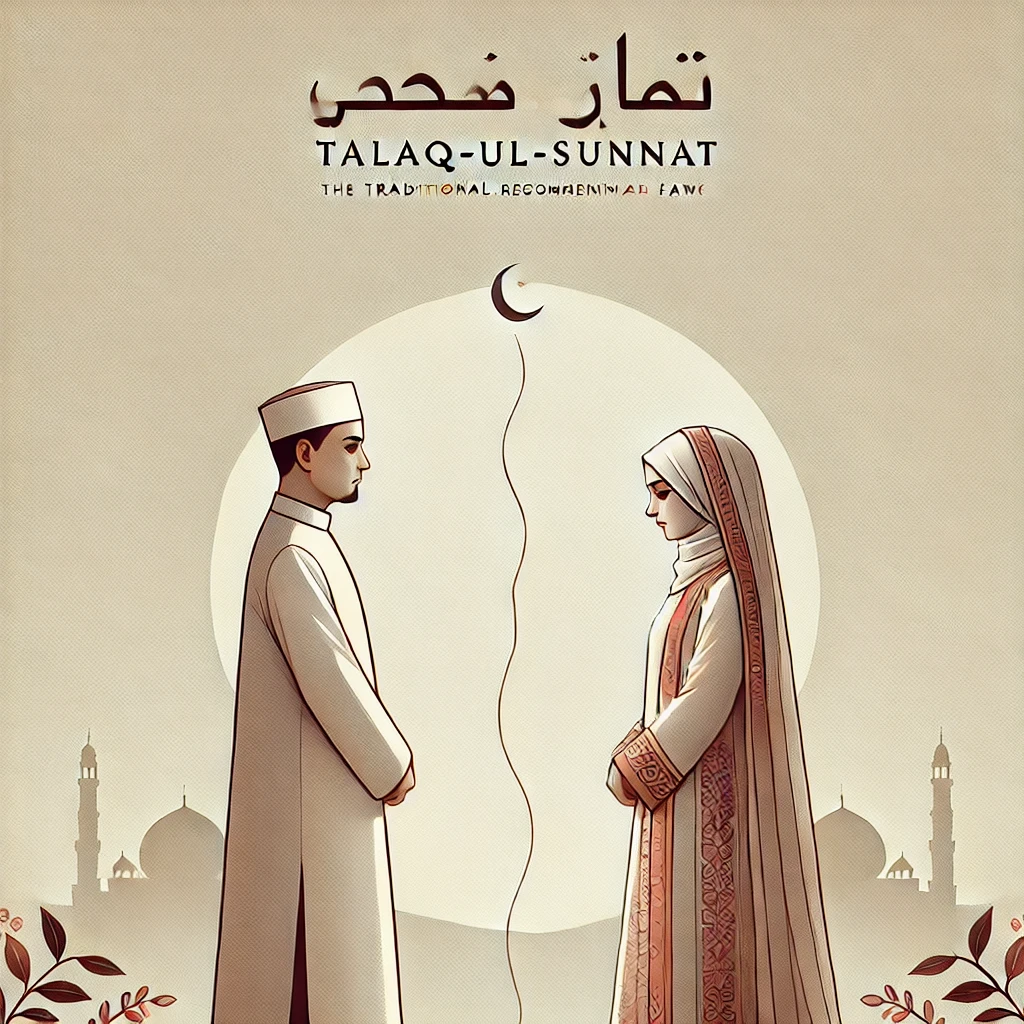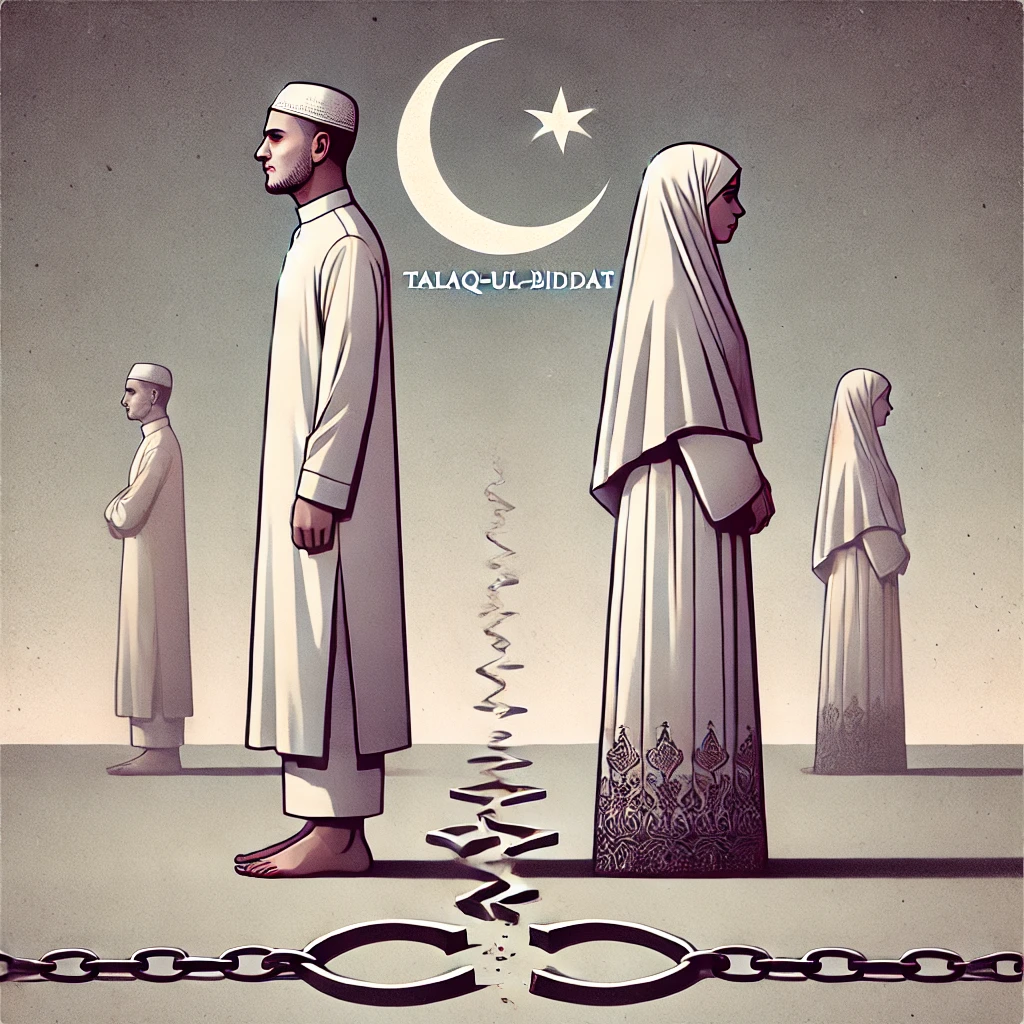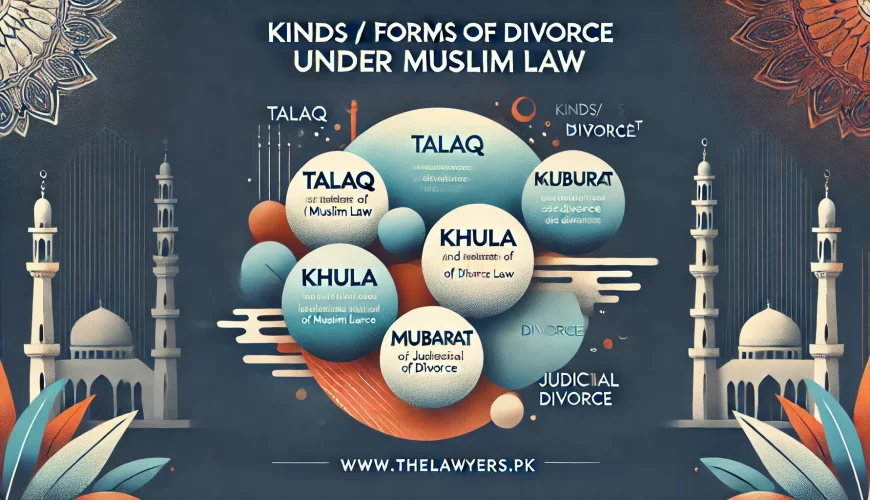Divorce, or “Talaq,” in Islamic law is the formal termination of a marriage. Islamic law provides for several types of divorce to account for various situations and complexities that may arise within a marriage. Each type is designed to ensure that both parties, especially women, are protected, and that the dissolution of the marriage is carried out in a manner that is just and balanced. This article aims to provide a detailed analysis of the different kinds of divorce under Muslim law, exploring their features, conditions, and legal implications.
1. Divorce Initiated by the Husband (Talaq)
Under Muslim law, the husband holds the primary right to dissolve the marriage through a process called “Talaq.” This right is not absolute and comes with specific regulations that ensure fairness. There are various forms of Talaq, each with its own process and requirements.
1.1 Talaq-ul-Sunnat

Talaq-ul-Sunnat is considered the most appropriate and recommended form of divorce, following the practices of Prophet Muhammad (PBUH). It is divided into two types:
- Ahsan Talaq (The Best Form): Ahsan (meaning “best” or “most appropriate”) is regarded as the most preferred form of divorce in Islamic law. It is a single pronouncement of Talaq made during a wife’s period of purity (Tuhr), followed by a waiting period known as “Iddat.” During Iddat, the couple can reconcile, and if no reconciliation occurs, the divorce becomes final at the end of the Iddat period.
- Hasan Talaq (The Good Form): Hasan (meaning “good”) is also a recognized form of divorce under the Shariah but is less preferred than Ahsan. In Hasan Talaq, the husband pronounces the Talaq three times over three consecutive periods of purity. After the third pronouncement, the divorce becomes irrevocable. Reconciliation can take place before the third pronouncement, but after that, the marriage is permanently dissolved.
1.2 Talaq-ul-Biddat (The Irregular or Innovative Form)

Talaq-ul-Biddat, also known as “Triple Talaq” or “Instant Talaq,” is a practice that allows a husband to pronounce Talaq three times in one sitting, effectively ending the marriage instantly. This form of divorce is considered an innovation (Biddat) because it deviates from the more thoughtful and gradual processes of Ahsan and Hasan.
Talaq-ul-Biddat has been the subject of considerable controversy in modern times due to its irreversible nature and the lack of opportunity for reconciliation. Many scholars consider it un-Islamic and harmful, and it has been banned or heavily regulated in several Muslim-majority countries, including India, where the Supreme Court outlawed it in 2017.
2. Divorce Initiated by the Wife
While the husband’s right to Talaq is more commonly known, Muslim law also provides several avenues through which a wife can seek divorce. These include:
2.1 Talaq-e-Tafweez (Delegated Divorce)
Talaq-e-Tafweez is a form of delegated divorce where the husband grants the wife the right to initiate the divorce on his behalf. This delegation can occur at the time of the marriage contract (Nikah) or afterward. In this case, the wife has the same power as the husband to pronounce Talaq, and she can dissolve the marriage whenever she sees fit, provided the terms of delegation are met.
The delegation of this right is usually conditional and often specified in the marriage contract. For example, the wife may be given the right to Talaq if the husband fails to provide for her or mistreats her. This form of divorce empowers women and provides a significant level of security in the marriage.
2.2 Khula (Divorce by Mutual Consent)
Khula is the process where the wife seeks divorce by offering compensation to the husband. The term “Khula” means to “remove” or “untie the knot,” referring to the dissolution of the marriage. In this case, the wife initiates the process by offering the husband a mutually agreed-upon compensation, often in the form of returning her dower (Mahr) or some other asset.
Khula can only be granted if the husband agrees to the terms, as it is a consensual form of divorce. However, if the husband refuses to accept the compensation and allow the divorce, the wife may seek judicial intervention.
2.3 Faskh (Judicial Divorce)
Faskh refers to a judicial annulment of marriage. It is the dissolution of the marriage by a judge or Qadi due to specific reasons allowed under Islamic law. This type of divorce is typically sought when the husband refuses to divorce his wife or the marriage becomes unbearable for the wife. The wife must present valid grounds for seeking Faskh, which may include:
- Failure of the husband to provide maintenance (Nafaqah).
- Cruelty or abuse by the husband.
- Impotence or other physical incapacities.
- Prolonged absence or disappearance of the husband.
- The husband’s refusal to fulfill marital obligations.
Once the court grants Faskh, the marriage is terminated, and the wife is free to remarry after the completion of her Iddat period.
2.4 Lian (Oath of Condemnation)
Lian is a unique form of divorce that occurs when a husband accuses his wife of adultery without providing witnesses. If the wife denies the accusation, both parties must swear an oath of condemnation, known as Lian. After this process, the marriage is automatically dissolved. This provision is designed to prevent false accusations from damaging the wife’s reputation and dignity.
The process of Lian is carefully regulated in Islamic law to ensure that both parties have the opportunity to present their case and that false accusations are not made lightly.
3. Mutual Agreement Divorce
Apart from Khula, another form of divorce by mutual consent is Mubarat, where both the husband and wife agree that they no longer wish to continue the marriage. Mubarat differs from Khula in that the desire for separation is mutual, rather than being initiated by one party.
In Mubarat, both parties express their intention to dissolve the marriage, and the divorce is finalized after the wife returns part or all of her dower (Mahr) to the husband, depending on their agreement. Mubarat allows for an amicable separation, provided both parties agree on the terms.
4. Types of Divorce Based on Revocability
Muslim law categorizes divorces into two primary forms based on whether the divorce can be revoked:
4.1 Revocable Divorce (Talaq-e-Rajai)
Talaq-e-Rajai refers to a revocable divorce. In this case, the husband pronounces Talaq but retains the right to revoke the divorce before the end of the wife’s Iddat period. The couple can reconcile without needing to remarry, provided the husband retracts his pronouncement of Talaq within the Iddat period.
If the Iddat period expires without reconciliation, the divorce becomes final, and the marriage is terminated. The couple may still remarry after this, but a new marriage contract would be required.
4.2 Irrevocable Divorce (Talaq-e-Ba’in)
Talaq-e-Ba’in refers to an irrevocable divorce. Once Talaq-e-Ba’in is pronounced, the marriage is immediately dissolved, and the couple cannot reconcile without remarrying. This form of divorce can occur in several situations, such as after the third pronouncement of Talaq in Hasan Talaq or if the wife seeks Faskh through judicial intervention.
Irrevocable divorce ensures that once a marriage is deemed unworkable, both parties can move on without the possibility of reconciliation within the bounds of the same marriage.
5. The Waiting Period (Iddat)
A central concept in Islamic divorce law is the waiting period, known as Iddat. Iddat serves multiple purposes, such as allowing time for reconciliation, confirming whether the wife is pregnant, and ensuring that any future children belong to the right father.
The length of the Iddat period depends on the wife’s circumstances:
- If the wife is pregnant, Iddat lasts until she gives birth.
- If the wife is not pregnant, the waiting period is three menstrual cycles or three months.
- If the marriage was not consummated, there is no Iddat period.
During Iddat, the wife remains entitled to maintenance from her husband, and both parties are encouraged to reflect on the possibility of reconciliation.
6. Modern Developments and Reforms
In modern times, several Muslim-majority countries have enacted reforms to address perceived inequities and complications in divorce procedures. These reforms seek to ensure greater protection for women and reflect contemporary views on gender equality.
6.1 Triple Talaq Bans
One of the most significant recent reforms has been the banning of Talaq-ul-Biddat, or Triple Talaq, in several countries. For example, India’s Muslim Women (Protection of Rights on Marriage) Act, 2019 criminalized the practice, making it punishable by imprisonment. Similarly, other countries such as Pakistan, Bangladesh, and Egypt have also introduced measures to regulate or prohibit the use of Triple Talaq.
6.2 Khula Reforms
In some jurisdictions, Khula has been made more accessible to women, allowing them to obtain a divorce without the need for the husband’s consent. For example, in Pakistan, family courts can now grant Khula without requiring the husband’s approval if the court finds sufficient grounds for the divorce.
6.3 Women’s Rights in Divorce
Several modern reforms focus on ensuring that women have greater access to divorce and are protected from financial and emotional hardship after the dissolution of marriage. For instance, laws have been introduced to ensure that women receive fair compensation, maintenance, and custody rights after divorce.
7. Conclusion
Islamic law provides a comprehensive framework for divorce, allowing both men and women to end a marriage under various circumstances. While the husband traditionally holds the primary right to initiate divorce, several avenues exist for women to seek dissolution of marriage, whether through mutual consent, judicial intervention, or delegation of rights.
Each form of divorce is designed to ensure fairness and justice, reflecting the underlying principles of Islamic law. However, modern developments and reforms have sought to address challenges and inequities that arise in contemporary societies. Countries around the world continue to navigate the balance between upholding traditional Islamic principles and ensuring gender equity and social justice in marital relations.
As Muslim societies evolve, the laws governing divorce will likely continue to adapt, ensuring that the rights and responsibilities of both parties are protected within the framework of Islamic teachings.


